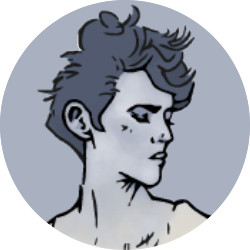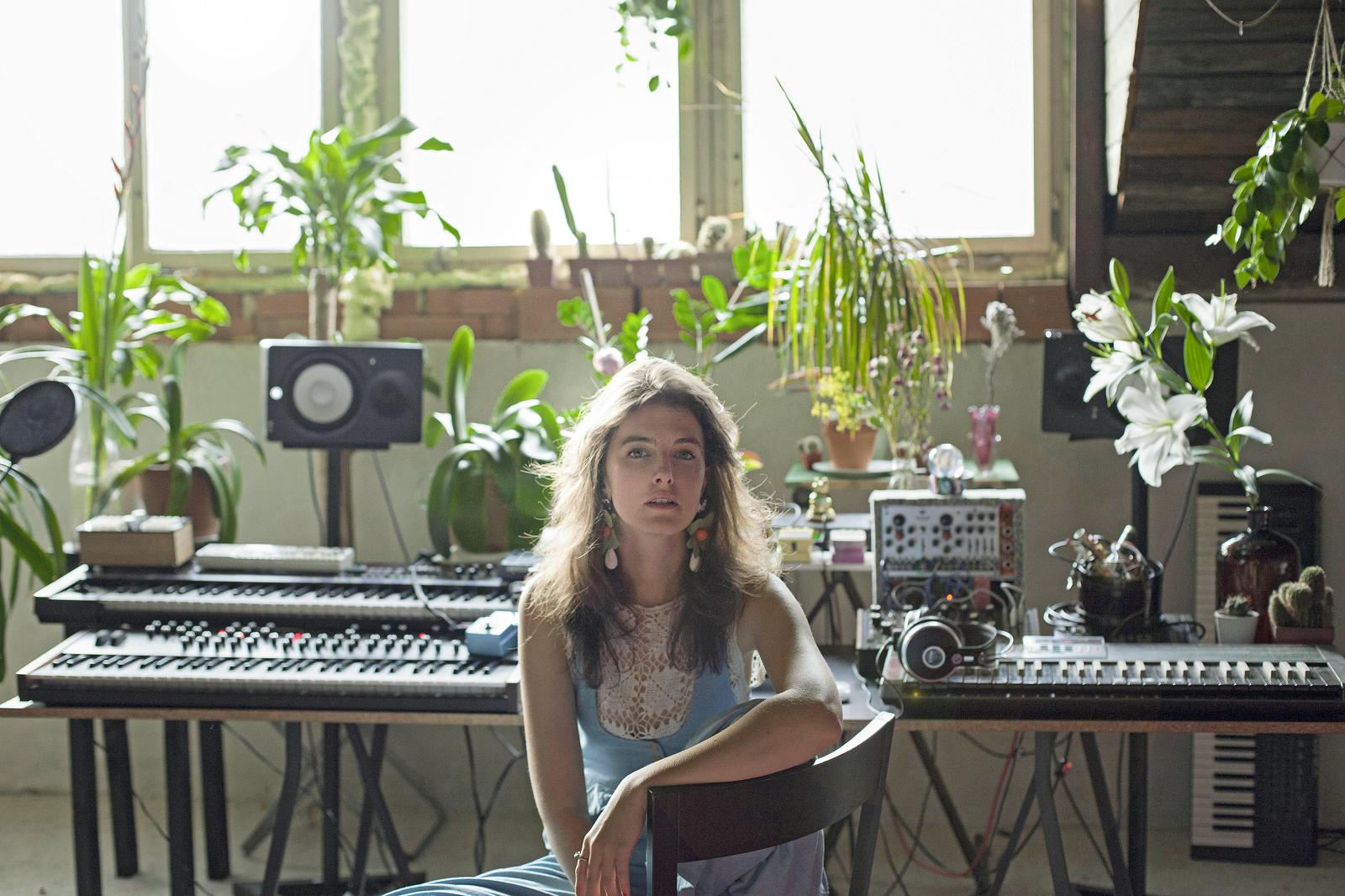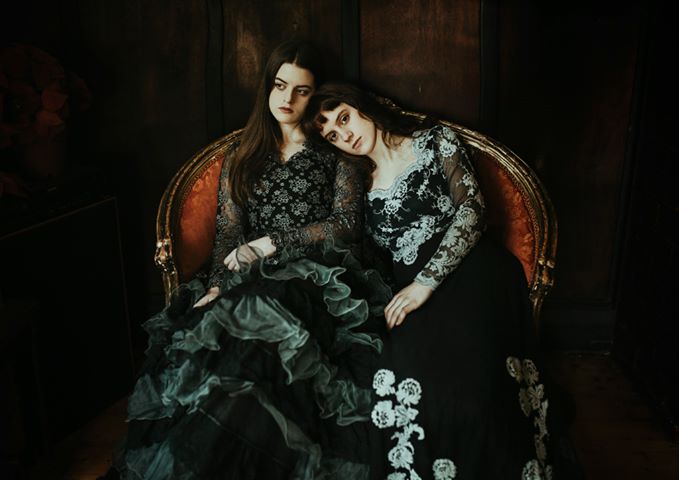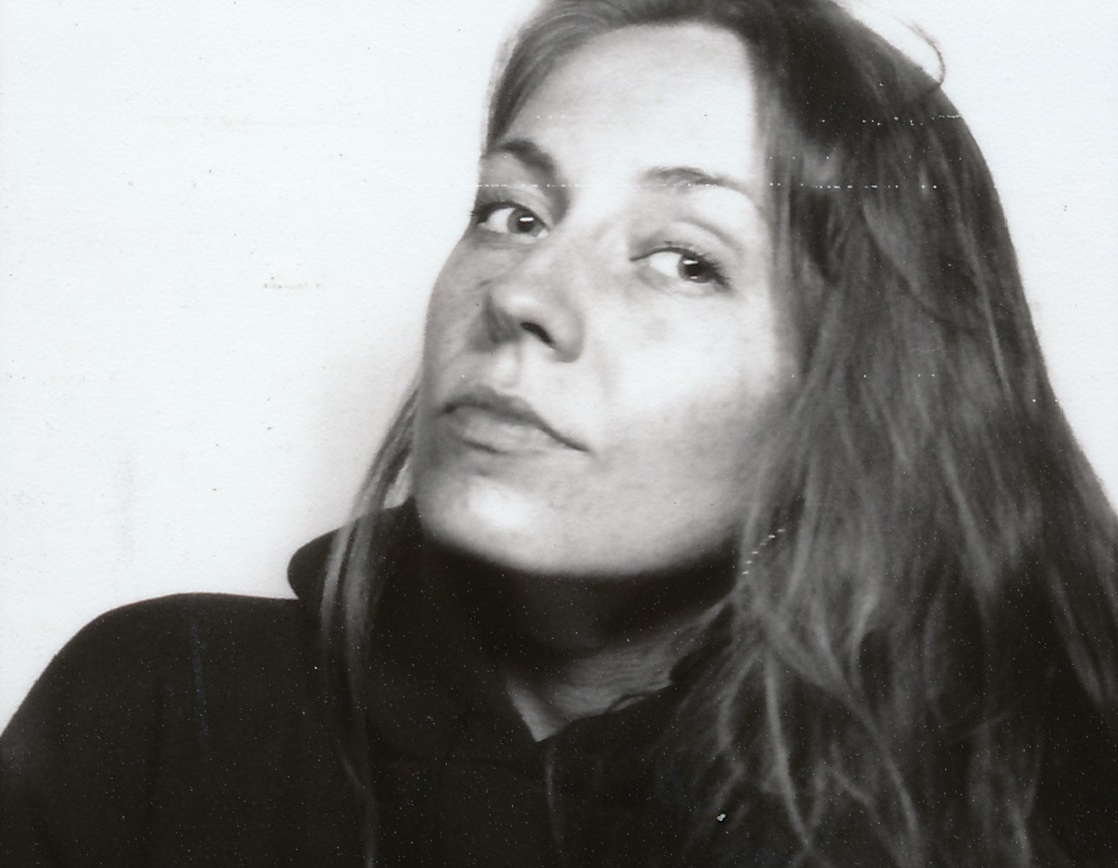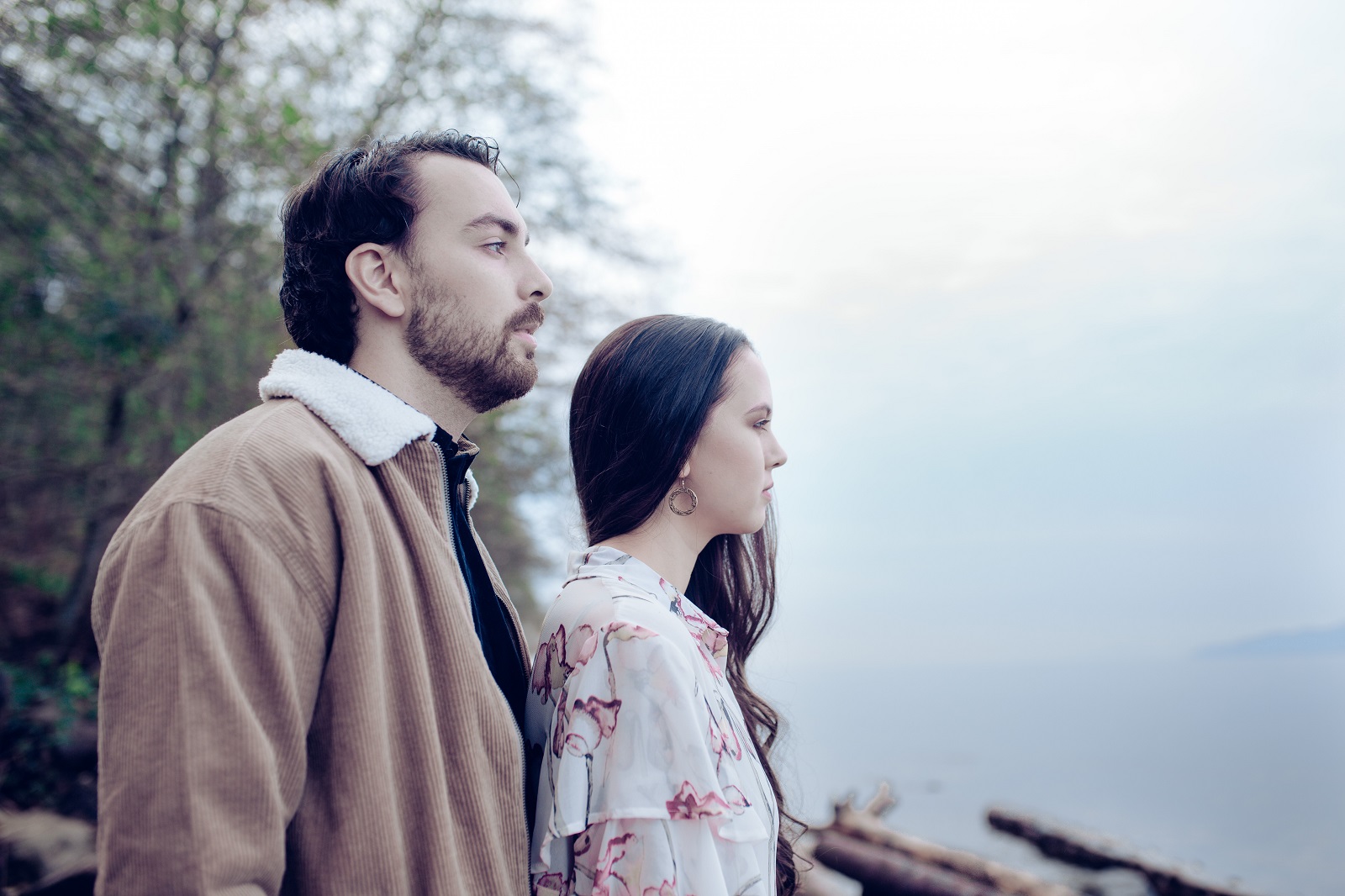 Photo credit: Allison Taylor
Photo credit: Allison Taylor
The Interview
What was it that initially inspired you both to start making music and writing songs?
Craig: We tried for a really long time, actually. We’ve been together eight-and-a-half years now, and we were always musicians but, when we tried making music before, nothing really clicked. We kind of accepted that, and had our own projects that we were working on. For this project, the catalyst was that Victoria saw a painting by Gustave Doré, called Andromeda —
Victoria: We just needed something to unite us. I asked Craig if he could help me make music that sounded like the painting looked. Craig totally understood what I was after, so we had this unified vision of what we wanted. We had lots of bits and pieces of music that we’d been writing independently — I guess stockpiling, really, but not knowing for what, because at that point we hadn’t released or recorded anything together. For some reason, the little bits and pieces came together in a way that actually made sense.
Craig: Yeah, and the record was pretty much written in a month after that. Once there was a vision for the project, it made sense, instead of just trying to force things.
Are you from quite different music backgrounds?
Victoria: I guess you didn’t really grow up with music. It wasn’t until you were a teenager that you started to pick up the guitar.
Craig: My guitar teacher would show me music, but there wasn’t really a whole lot of music in my household.
Victoria: Whereas I grew up in a very musical house — not that anyone in my family could actually play music, but I was exposed to a lot of music, and I was always singing lots of nineties grunge. Craig was late to the game and had a lot of catching up to do musically, exploring all these things at a way older age. It was only like two years ago that you really discovered Pink Floyd. [laughs]
Craig: Now I know every album inside out. I still need to get into Led Zeppelin. There are too many good bands. I feel like I’m still catching up.
Is there an aspect of being songwriters and musicians that you’ve grown to enjoy more since finding a way to work together on a project?
Victoria: For me, the recording, because that was something totally foreign. Prior to that, with any little pieces of recording I had done, I was very much just the musician — I went in there, said my piece, and that was that. But Craig was approaching it very DIY — he had that background knowledge of recording, so he definitely took the lead, but I was able to be way more involved than any other musical endeavour I’d ever done before. So, for me, I didn’t even know that having an interest in recording was a possibility.
What is your songwriting process then?
Craig: With this record, it varied from song to song. For a song like Penelope: that was very much based off of the painting and going for a very cold, urgent kind of sound. A song like Daughter of a Naiad: we knew we wanted to explore a loop, and that was more of an experiment.
Victoria: I think by the time we get together to write a song, there’s always a foundational element that has already been established, and we go from there. I think the reason we couldn’t work together prior was because we’d just sit down with a blank canvas and be like, “Okay, let’s write a song.” That didn’t work for us, but having little bits and pieces to bring to one another, to expand upon together, seems to work better for us.
You list 13 musicians — in addition to yourselves — that played on the album. Was it daunting to be bringing in so many people for a debut record, and did you have any doubts about the size and scope of the project at any point along the way?
Victoria: Only when we were too far in. [laughs] Because we laid down the drum tracks, and at that point, live performance-wise, we’d only performed three times, and that was as a duo. It was difficult, because we didn’t know what these songs were really gonna sound like or manifest into. For our live performance, we’ve developed a very intimate, ambient sound that sounds nothing like the record. But, at that point, we had these drum tracks laid down, so we were just like, “Okay, we’re committing. We’re gonna do this full band sound.” And at times, yeah, we were super in over our heads, and it took us years to make this record — partially because we had no idea what we were doing, it was such a big undertaking, and there wasn’t an overarching producer to rein us in.
Craig: Yeah, that was a huge thing, so we just piled it on and piled it on. And I’m glad we did. We were lucky, because a lot of the folks who played are friends, so it was a little bit of a different dynamic than if they were session musicians… Well, they are session musicians, but they’re friends first. So, we could go over to their house and rehearse the parts and experiment with things. A lot of the time we recorded parts at home, so there was no pressure of a studio. We did one day, for guitars, in an expensive studio, because I figured, “I’m playing it, so let’s go to the nice studio in town.” I just racked up a big bill and was too focused on the time wasted in the studio to get good tracks down. I ended up redoing them in a cheap studio.
Have you managed to get the feel of the studio songs into any of your live performances?
Victoria: We have, only once: for our release show. It was our first time with a full band, so the first time with drums, and I think the biggest difference between our normal live performance and the record has to be the drums. Because there are times where the drummer is really giving it, and it totally changes the feel of the song. It turns them into something much more rock driven. So, for the release show, we had the drums, bass, keys, a second guitarist, and we had the horns come play on stage with us. It was definitely still different, but it gave that feeling of the record. As a five-piece band, it’s not quite the same — I think the horns really add a dimension to it — but I think it still, compared to our duo sets, closer emulates the feeling of the record.
Okay, so how long do your creative ideas generally take to develop?
Victoria: I think, cumulatively, once we have one little idea and we want to expand upon it, that can happen really quick. But finding that first initial idea, there’s no rhyme or reason. At this point, I don’t feel like I want to push it because, when we tried to do that before, we weren’t able to come up with anything — when we just let it happen, we made a record.
Craig: Yeah, and we’ve got some little ideas for the next thing, and it’s not like they were forced at all — we were just jamming.
Victoria: And just the nature of it: we both work full time, we’re working on the record, we have shows — there’s not that much time for us to work on these ideas, so it does allow them to fester, but maybe in a more positive way. The nature of life allows them to sit and settle, and then we get to come back to it with some space, and I always think space away from an idea is the best thing for it.
Do you connect quite quickly to each other’s ideas?
Craig: Yeah, totally. I feel like, at first, there was a little bit of hesitation, because trying to express your deepest thoughts when it comes to art, it feels —
Victoria: Very vulnerable. It’s weird. Craig and I have been together for so long — the person who, in every other aspect, we’re okay being vulnerable with. You would assume musically it would be the same, but I think, for me, it was just very much this feeling of: I really respect what he does, and I want him to respect my thoughts — I’m scared to show them because, if I don’t fully believe in them, how am I going to show them with conviction? Just getting past that.
Craig: But now, I feel like there’s an openness. I’m not gonna speak for you, but —
Victoria: Yeah, it’s true. I don’t care now. [laughs] We do have a similar vision and so, even if something doesn’t get used, I feel in the creative process it’s never like, “Ew, I don’t like that. That sounds crap.” [laughs]
Craig: The only thing that will ever be shut down is something where it’s like, “Oh, that doesn’t quite sound ‘Porteau'”.
Victoria: Yeah, there’s lots of stuff that I tell him he should do on his individual projects, just because I don’t think it fits. But I think, in general, yeah, we’re pretty closely aligned and pick up on one another’s ideas very quickly.
Do you find it quite easy then to share songwriting duties?
Craig: Yeah, totally.
Victoria: We kinda fell into roles.
Craig: That’s exactly what I was gonna say.
Victoria: I was mostly writing melodies and lyrics, and Craig was mostly writing guitar ideas. In some cases, like for River Song, I did have this synth idea, and then in Re:Birth, Craig had some lyric ideas. But that was an anomaly. It kinda felt like, in a way, you were working with someone who could pick up the pieces of an aspect of songwriting that maybe wasn’t your strong suit. I don’t have the chordal knowledge Craig has — if I’d have put these songs to piano, which is how I would have done them, they would have been much more simplistic. But, I was able to work with someone who had a greater understanding. Craig was able to have these wacky chordal ideas, and as someone who has a pretty strong sense of melody, I was able to put melodies over, and sing over, these chords that he himself wouldn’t have been able to on his own stuff. So, it worked out well. We played off one another’s strengths and weaknesses.
Is there a particular mood you tend to be in when you do your best writing?
Craig: [laughs] I feel like, when we were writing this record, we seemed to always have a beer or two on the go.
Victoria: That’s not a mood though. Beer isn’t a mood. [laughs]
Craig: Yep, mood of beer…
Victoria: I think, for me, I have to be in a contemplative state, just because of the way I’ve found I write. I have to have a personal experience, but need to be able to relate it to something else around me. If I try to do that when I’m super sad, mad, happy or whatever, it’s not gonna happen. I have to have space and be in the mood for reflection.
Craig: I need to have nothing on my schedule. I just need to have a chill night. I couldn’t write something under pressure, I don’t think. If I have to go out later in the night, and I have an hour, I’m never gonna write something.
Is there anything in particular you do to stimulate your own creativity then?
Victoria: For me, with writing, yes. I just force myself to sit down and write. Especially when I was writing this first record — I would just go to the beach with my pen and paper, and even if I thought nothing good was coming of it, force myself to sit there. And I still do that now. I have so many notes on my phone of ideas, and just giving myself the room to explore them — I think that, for me, is kinda the way that I help stimulate it. Allowing yourself to expand. Because, sometimes, it’s so hard — we’re a very fast paced society, and you’ve got this little idea, and maybe you’ll write it down really quick, but then you come back to it and you’re not in that head-space. It’s really hard to have that resonate with you again. So, just taking time — slowing down a little bit — and catching yourself when you’re in the moment as opposed to trying to relive it, which is so difficult.
Craig: For me, I guess, sonically, I’m always listening to records and taking notes to get some production ideas. A lot of my ideas for the next record are not songs or chords or lyrics at all — they’re just wanting to try this production idea, or this wacky thing I heard somewhere, or trying to adapt what this person was trying to do.
Is that a process pathway you’ve trodden before, or is it something that’s new for you?
Craig: It kinda came with recording this album. Along the way, I would just hear these things that seemed very obvious. We wanna play around with the vocals some more, I think. Because there is actually a layer of processed vocals underneath a lot of the vocal tracks — you can’t really hear it, but it does thicken it up. Things like that, field recordings, and I think it would be really cool to make some beats out of different sounds — not a drum kit. Doing this record made me more interested in that kind of approach.
Is it daunting that you have so many options available to you? That relatively small things — like the layers of processed vocals you spoke of — can ultimately make a tangible difference to the final result?
Victoria: Yes. There are so many layers on the tracks, you get to a point where you’re like, “Why not just add some more? You know what? Instead of doubling them, let’s triple them! Why not?”
Craig: I mean, for a lot of the vocals, there are like ten vocal tracks stacked on top of each other, plus the exact same vocal lines through a harmonised plugin re-amped through a guitar amp. Stuff like that. So, it is overwhelming.
Victoria: It is easy to get carried away, and we definitely did. [laughs] Because, again, we didn’t know what we were doing, right? The whole thing was this big experiment for us. We did have our sound engineer — he worked pretty closely with us — and he was very much a voice of reason. Craig is very much a neurotic worker.
Craig: [laughs]
Victoria: He hones in and focuses. Like, I always thought I was a perfectionist, but then I worked with Craig, and I realised, “Whoa! No, I have nothing on Craig.” [laughs] There’s like a level of neurosis that’s rare to find in a person, but Craig has it.
Craig: Oh, wow. [laughs]
Victoria: It’s a good thing, don’t get me wrong, because as I said, you were able to hone in on things that I never would have honed in on. But it’s nice to have a ying and yang, so the sound engineer, Andy Schicter, he was really good at saying,”You know what? I think we’ve dialled in as good as we’re gonna get — try to think big picture, and let’s move on.” Otherwise, I feel like we’d be on a free-fall of trying to dial in effects or sounds or adding layers. So, it’s always nice when you have someone to tap you on your shoulder and be like, “Let’s move on.”
Craig: I mean, I can hear all the parts that are in it, but someone listening to it for the first time, it probably doesn’t sound that dense. The next record is maybe going to be a bit more intimate in spots — I’m kinda learning from that. It worked for these songs, I think, but —
Victoria: There’s value in space, which the songs, in this instance, didn’t lend themselves to in the same way. But I think, in our minds, we want to create a bit more space in these new songs we’re gonna work on.
So Craig — you’ve just been accused, with quite hearty assurance, of being uniquely neurotic. Care to comment?
Craig: I guess it’s a very real thing. [laughs]
Victoria: [laughs]
Craig: I’m just very passionate about recording and music in general. We just wanted to make the best record possible, and I feel like we did. The only way I knew how to go at it was just just obsessing over everything. I had a list for every single thing. I think each song probably went through ten lists of things to do.
Victoria: I think you just approached the record in the way you approach life. I don’t wanna say you’re a neurotic man in your day-to-day life — [laughs] — but you’re a very attention to detail [person]. You love your lists. So, you just took that day-to-day approach to life and applied it to the record, which is great because it created a level of organisation that me, as a messy person, never would have been able to muster. So, I think it worked well.
The songs on the album do feel very full in terms of their ability to to deliver an atmosphere and transportative experience. I guess a lot of that comes down to the attention you paid to small details.
Victoria: I mean, it got very in-depth. There was really no, “Okay, well that sounds good — let’s move on.” That never happened. Even with the vocals — layering them — we’d go in, and I didn’t really no what the harmonies were going to be, so we were experimenting. We did all the vocals at home, so we had that luxury of not being on studio time. We would record like thirty takes of a little section, and then I’d come out of our little makeshift vocal booth and we’d sit there with pen and paper, like, “Track one: this word was good, that word wasn’t good”, and go through each take piece by piece — in many cases, word by word — and kinda fit them together. It took an extremely long time, and other people we’d talk to would tell us that we were being absolutely ridiculous. But it was our first time, so we didn’t even realise the degree of neurosis that we were partaking in. Everyone was like, “That’s how you’re doing it? That’s really interesting. I would never.” [laughs]
Craig: It’s not like we were super stressed out.
Victoria: No no, it’s just how we did it.
Craig: A lot of the stuff that comes to mind is when we were mixing it. I would sit there, and I would keep hearing these resonant high-pitched frequencies that would pop up. I have a synth on my phone that can play really high-pitched ringing sounds, and I would find all the resonant frequencies and we’d EQ them out so that it sounds smooth. I’m sure lots of records are doing that. Because we have the option of doing it at home, which a lot of folks don’t, we were able to obsess over certain parts. And a huge benefit of doing a record over a long period of time is that the expenses you incur are spread out, so that worked a lot better for us too. If we had to pay a huge chunk to record the album in a short amount of time, this record would not sound the way it does.
Okay, so what do you feel is the most important element of a Porteau song?
Craig: Having lyrics that can be interpreted in different ways. A lot of the lyrics on this album, they are personal, but they’re intentionally vague as to what’s being discussed. The next record, we want to continue making music that’s even more personal. I also think mantras are pretty important to our sound, and the other thing is the guitars playing off of the words. So, very light, ethereal-sounding guitars, hopefully with a lot of space, a lot of delay. As soon as we started writing these songs, I bought one of those RE-201 Space Echo units. Every single track on the album has the Space Echo on the guitars. It even has the Space Echo on the vocal tracks for a couple of them, like on Daughter of a Naiad. That kinda gives it a warmth, but also a brightness. Also a bit of uncertainty, because the tape would often screw up.
Victoria: Also openness and mysticism, to some kind of regard.
Your songs do elicit a strong sense of mysticism and reverence for the earth. Where did those aspects of the record come from?
Victoria: I feel like, with songwriting that I had done before, I really struggled to just put pen to paper and write down how I was feeling and feel even remotely poetic about it. I guess there was a level of vulnerability there too that I wasn’t comfortable with. It just felt very much like: This is me, and I have nothing to relate myself around to; I’m just exposing myself.
I had spent a bit of time up in Alaska, and I was just surrounded by nature. I had felt so good, so at peace and more connected. I kinda realised that finding that connection to the world around me, it made my problems seem a little less daunting. It was like I could see this parallel between personal experience and the natural world. So yeah, I guess there was a reverence for the world around me, just because it was grounding. Once a few ideas started to come together, Water’s Gate made sense, thematically, coming from that perspective. I wouldn’t say all the lyrics I write have that connection to the earth, but thematically, for the record, it made sense for them to. I guess it was almost out of necessity — it was a way for me to feel comfortable telling my stories, but veiling it with this mysticism, and also feeling a genuine connection to it.
Do you feel your songs offer an escape from the chaos of the modern world?
Victoria: I would hope so. For me, they very much do. There’s so much going on around us, and creating time and space is such a difficult thing today. There is an importance in it. Often, one of the easiest ways to make that time for yourself is to detach from the chaos of society and go on a hike, go camping, swimming, whatever it is. There’s something pretty powerful in that: being able to uproot yourself from your day-to-day life and reconnect. I hope that the imagery and the mystic idea that’s discussed does invoke that sense in people, because that’s definitely what I was trying to portray.
So, what do you feel that you gain from being artistically inclined?
Craig: Going off that last question a bit, I just feel like I’m able to chill out more. These songs, especially when we’re playing them live or just jamming with the band in rehearsal, you can get lost in them a little bit. When we play them live, certain parts are improvised, so that’s kind of our escape: being able to get lost in the songs still. Even though we’ve played them lots of times, we’re still discovering new layers and changing things.
Victoria: Yeah, and just in general, to be an artist: it’s just a way of expression. I’m always trying to wrap my head around like, “What’s this all mean? What’s going on?” I feel like I’m in a constant state of being perplexed by life and the weird stuff that goes on. Being able to have an outlet to digest that, it seems so unfathomable that some people are being assaulted with the same chaos and just have to sit there with it — there’s no output, no matter what medium. I can’t paint, I can’t draw, but I can imagine if you have that ability, that would be just as cathartic. It’s just having any way to output all the stuff that’s constantly being thrown your way. It feels like a real privilege to have that ability.
Craig: Yeah, it feels quite freeing to me. The other cool thing is: we get to go out and experience other bands playing music all the time, which is super inspiring — not just to make music, but inspiring in day-to-day life.
Your music, to my mind at least, doesn’t necessarily fall into a specific genre. How have you found it in terms of connecting with other bands, and also promoting yourself?
Victoria: In Vancouver, at least, there seems to be an acceptance of an eclectic bill, and often we will create a level of eclecticness, just because the music is a little different from a lot of the folk singer-songwriters that we’ve kinda aligned with in the music scene here. The music’s not too outlandish that it feels alien.
Craig: I would say that we’ve possibly played some shows where we felt afterwards that we didn’t fit.
Victoria: That is true. We’ve learned our lesson, that way. There are certain instances where you would picture a singer-songwriter working; where you could imagine parents and their children, maybe grandmas, and there will be a baseline of enjoyment — we’ve performed in those cases, and there is not a baseline of enjoyment. [laughs] And it’s super obvious.
Craig: But you don’t know going in.
Victoria: Yeah, as a small band going in, you’re taking these shows and maybe not knowing exactly what it’s gonna be like — getting there and understanding that maybe you’re not exactly what this space is meant for. [laughs] That does happen but, in general, we’ve been pretty lucky. With promoting it, I do find that difficult. I don’t really know where the record really sonically fits. Even in terms of playlists and all that stuff. For me, it seems very challenging. I feel like, maybe it is actually a challenge for people to put it into a certain feeling or genre. So, live performance-wise, it hasn’t really been an issue, but when it comes to ‘grand picture’ promotion, yeah, it has been a little more challenging.
Finally, to what extent would you like your creative output to define you as people?
Craig: Oh, that’s a hard question. I’ve not thought about it before.
Victoria: I have been reflecting a lot lately: Why would I want to be a musician? Why would I want success? Why would I want people to listen to it? Why wouldn’t I? What do I want out of music? I’ve always told myself that I just want to make music for the sake of making music, but then I’ve realised, as we’ve released this record — and there’s lots of rejection that you face — I’ve experienced feeling really upset by it, and hurt in a way that I didn’t expect. So, I’ve had to do a little bit of soul searching and try to figure out: Why do I feel that way? Because I’ve always told myself that I wouldn’t, but now that I’m faced with it, I do.
So, I think for me, there’s one hundred percent a base line of insecurity there that, I guess, you don’t even realise you want to be subdued by assurance from others. Realising that about yourself is a hard pill to swallow, especially when you’ve always, out loud, said that’s not the case. So now, I almost don’t trust myself when I say like, “Oh, I don’t want my music to define me. I wanna be my own person.” I don’t know if that’s the case. I think I do, in a way. I do want this idea that I have created and presented, not to maybe define me, but to be a part of who I am and how I interact with the world.
I don’t know if that was a little rambly on my part, but it just felt very much along the lines of things that I’ve been trying to work through and digest myself… I don’t know how you feel Craig?
Craig: I’m still thinking about it.
Victoria: [laughs]
Craig: The way I see it, even though we talked about how I was neurotic about everything being right in the studio, a lot of the songs, especially guitar-wise, like in Stream and Moon Maidens — almost all of those parts are improvised. So, the parts are just moments in time that happened, and the reason I played that way was because I felt that way at the time. I think they sound quite sensitive and delicate. I don’t know if this is a good way to describe sound, but contemplative as well — the guitar parts are like discovering themselves. I’m okay with someone listening to that and making an assumption on who I am, I guess, but I’m also gonna change as a person as well.
Victoria: Yeah, I guess there is that kind of idea that it very much feels like a moment in time, but people are evolving. I do listen to people I know personally — I listen to their music — and it does help me get an insight into them in a way that I maybe otherwise wouldn’t have. So, if people get an insight into me in a way that perhaps they wouldn’t have — if they digest the lyrics and they’re able to see the more personal aspects that I’ve cloaked in metaphor — that’s awesome. Maybe they get to learn a part of me that maybe I wouldn’t feel comfortable talking about directly. Same with the music itself — you are evoking feelings, and maybe they see a sensitivity in your playing that they wouldn’t see in real life. So, I think there is something to be said for someone who’s truly listening to the music and deducing certain things from it — there’s beauty in that, for sure.
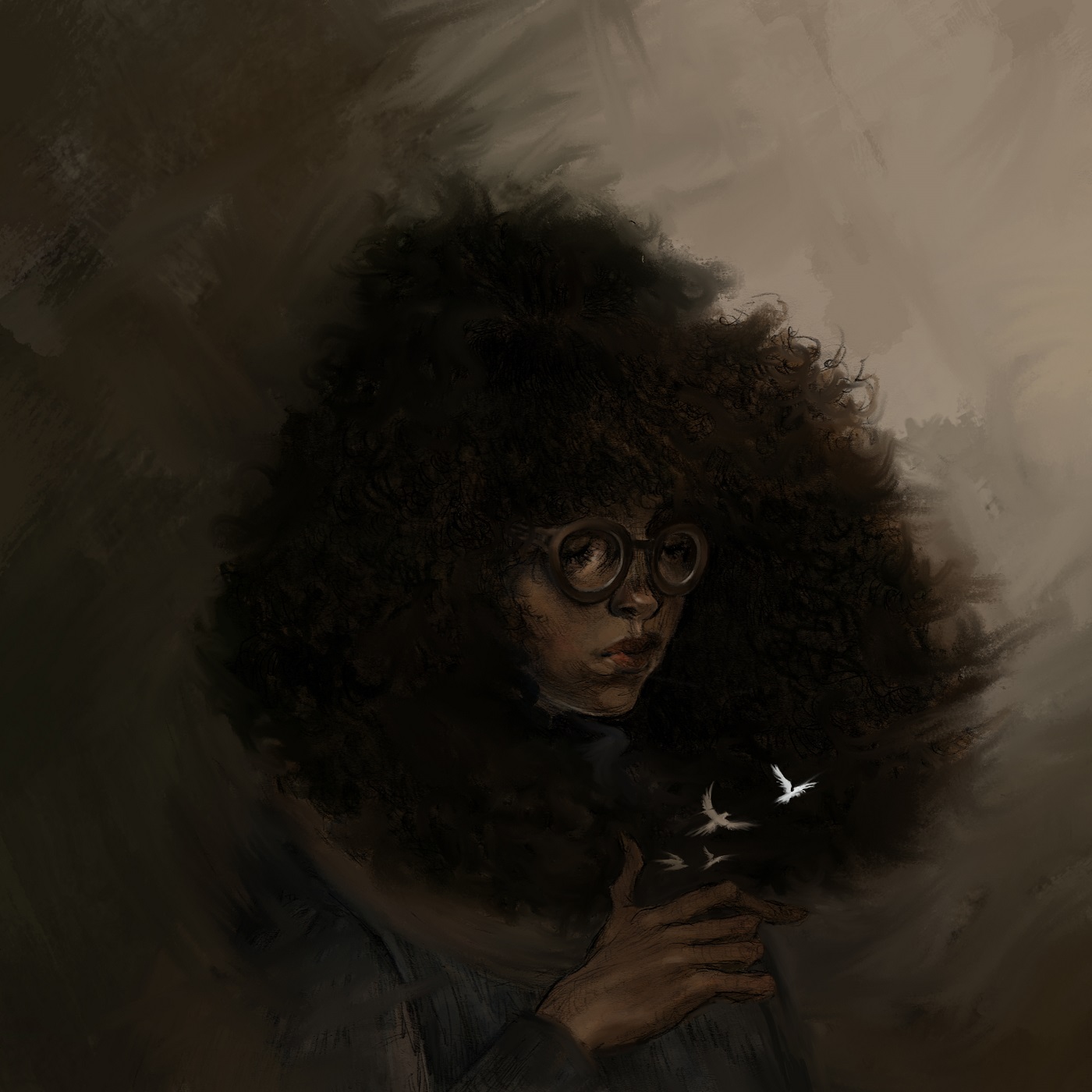 Porteau featured onBeautiful Songwriting 7
Porteau featured onBeautiful Songwriting 7You can stay updated with Porteau on Facebook and Instagram, and stream and download their debut album on Bandcamp.
If you enjoyed reading this interview and happen to think we're doing something right, please consider sharing the link -- whether on social media, or just with a friend, it'd really help us out! We're also on Facebook, Instagram (@alonelyghostburning) and Twitter, so if you'd like to keep up-to-date with the publication of new content, and also provide us with a whole heap of motivation, please do give us a like or follow.
